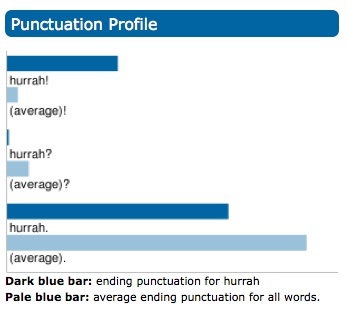Wordnik now has a word-of-the-day (henceforth WOTD) widget!
You can check it out and grab the code here.
With our new widget you can display the Wordnik WOTD on your blog or website, for the entertainment and edification of your readers!
If you’d rather follow the WOTD through RSS you can use this link. (You can also follow us on Twitter for WOTDs, interesting language links, and more.)
We’ve also added a new graph to some word pages—a punctuation profile!

The punctuation profile gives you an idea of how often a word is followed by an exclamation point, a question mark, or a period at the end of a sentence, as compared with the average for all words.
As you can see, an exclamation like hurrah is more likely than average to be followed by an exclamation point, and less likely to be followed by a question mark.
The punctuation profiles are turning up some interesting conundrums: for instance, why is the tally of question marks so high for the word peanut?

(It can’t all be because of Wordnik’s favorite movie…)
We hope you enjoy the words of the day and the punctuation profiles! If you’d like to email us suggestions for future WOTD candidates, you can do so at feedback@wordnik.com.
